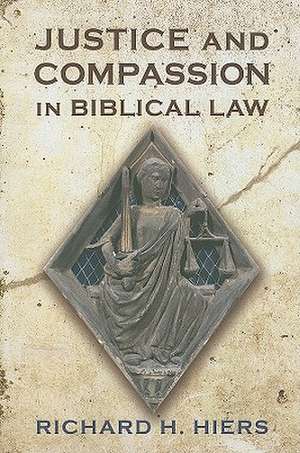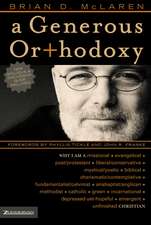Justice and Compassion in Biblical Law
Autor Richard H. Hiersen Limba Engleză Paperback – 13 feb 2010
The theory and praxis of biblical law in the historical and contemporary landscape of American law and culture is contentious and controversial. Richard Hiers provides a new consideration of the subject with an emphasis upon the underlying justice and compassion implicit within. Special consideration is given to matters of civil law, the death penalty, and due process. An analysis of various biblical trial scenes are also included.
The book draws on, and in turn relates to three areas of scholarship and concern: biblical studies, social ethics, and jurisprudence (legal theory). Modern legal categories often illuminate the nature of biblical law: for instance, by distinguishing between inheritance and bequests or wills (a distinction not found in traditional biblical commentaries), and by identifying the meaning or function of biblical laws by using such categories as contract and tort law, due process, equal protection, and social welfare legislation. Several discussions throughout the book compare or contrast biblical laws with modern Anglo-American law or social policies. Each chapter begins with two or three relevant quotations: one or two from biblical texts, and sometimes from one or two relevant latter-day sources, notably, Magna Carta, the United States Constitution, and writings by Ayn Rand, and Robert Bellah. Although modern law usually shows greater compassion, biblical law often combines concern for both justice and compassion in ways that sometime provide grounds for critiquing modern counterparts.| Toate formatele și edițiile | Preț | Express |
|---|---|---|
| Paperback (1) | 258.42 lei 6-8 săpt. | |
| Bloomsbury Publishing – 13 feb 2010 | 258.42 lei 6-8 săpt. | |
| Hardback (1) | 610.79 lei 3-5 săpt. | |
| Bloomsbury Publishing – 13 feb 2010 | 610.79 lei 3-5 săpt. |
Preț: 258.42 lei
Preț vechi: 296.48 lei
-13% Nou
Puncte Express: 388
Preț estimativ în valută:
49.45€ • 51.77$ • 40.92£
49.45€ • 51.77$ • 40.92£
Carte tipărită la comandă
Livrare economică 05-19 aprilie
Preluare comenzi: 021 569.72.76
Specificații
ISBN-13: 9780567269096
ISBN-10: 0567269094
Pagini: 256
Dimensiuni: 150 x 226 x 18 mm
Greutate: 0.41 kg
Editura: Bloomsbury Publishing
Colecția T&T Clark
Locul publicării:New York, United States
ISBN-10: 0567269094
Pagini: 256
Dimensiuni: 150 x 226 x 18 mm
Greutate: 0.41 kg
Editura: Bloomsbury Publishing
Colecția T&T Clark
Locul publicării:New York, United States
Descriere
The theory and praxis of biblical law in the historical and contemporary landscape of American law and culture is contentious and controversial. The author provides a fresh consideration of the subject with an emphasis upon the underlying justice and compassion implicit within.
Caracteristici
Persons
doing
religious,
particularly
Christian
ethics,
need
to
recognize
the
relevance
not
only
of
the
prophets
and
Jesusâ?T
teachings,
but
also
of
biblical
law.
Cuprins
AbbreviationsAcknowledgementsIntroductionPart
I.
Civil
Law
Chapter
I.
Biblical
Contract
Law
and
Biblical
Tort
Law
A.
Biblical
Contract
Laws
B.
Biblical
Tort
Laws
and
Remedies
C.
Biblical
Law
and
Modern
Law
Chapter
II.
Transfer
of
Property
by
Inheritance
and
Bequest
A.
Property
Subject
to
Transfer
B.
Inheritance:
Descent
of
Property
through
Intestate
Succession
C.
Wills
or
Bequests
and
Inter-vivos
Gifts
D.
ConclusionsPart
II.
Criminal
Law
Chapter
III.
Biblical
Trial
Scenes
A.
Genesis
38:24-26:
Tamar's
Evidence
B.
2
Samuel
12:1-16:
David
as
Judge
and
Nathan's
Parable
C.
2
Samuel
14:1-11:
Mitigation
and
Alternative
Sentencing
D.
I
Kings
3:16-28:
A
Maternity
Suit
E.
I
Kings
21:1-16:
A
Case
of
Malicious
Prosecution
F.
Jeremiah
26:17-24:
Defendant
Testimony
and
Argument
from
Precedent
G.
Leviticus
24:10-23:
A
Case
of
Blasphemy
H.
Numbers
15:32-36:
A
Case
of
Possible
Sabbath
Violation
I.
Susanna,
vv.
28-62:
Cross
Examination
Catches
the
Culprit
in
the
Courtroom
Chapter
IV.
Impartial
Judgment
and
Equal
Protection
of
the
Laws
A.
Impartial
Judgment
B.
Protected
Classes
Chapter
V.
Capital
Punishment
A.
Against
Capital
Punishment
B.
Capital
Punishment
and
Rationales
for
Execution
Chapter
VI.
Due
Process
Protections
A.
Places
or
Cities
of
Refuge:
Interim
Protection
for
Offenders
Awaiting
Trial
B.
"Diligent
Inquiry":
Investigation,
Hearings
and
Evidence
C.
Witnesses
D.
The
Punishment
Phase:
Sentencing
Guidelines
Chapter
VII.
Criminal
Law
in
the
Bible
and
Contemporary
Application
A.
Modern
Interpretation
of
Biblical
Texts
B.
The
Basic
Value
of
Human
Life
C.
The
Critical
Importance
of
Not
Executing
Innocent
PersonsPart
III.
Social
Legislation
Chapter
VIII.
Biblical
Social
Welfare
Legislation
A.
Protections
against
Injustice
and
Mistreatment
B.
Laws
Calling
for
Affirmative
Action
by
Private
PersonsChapter
IX.
Biblical
Social
Welfare
Laws
and
Modern
Social
PolicyChapter
X.
Concluding
ObservationsIndex(es)
Recenzii
The
connections
-
and
disconnections
-
between
religion
and
law
are
often
assumed
but
rarely
grasped.
Justice
and
Compassion
presents
in
a
delightfully
accessible
form
a
multitude
of
common
elements
between
western
law
and
biblical
sources.
Richard
Hiers
crafts
a
carefully
nuanced
approach
in
a
field
too
frequently
known
for
its
dogmatism
rather
than
its
doctrines
and
insights.
His
frames
of
reference
open
the
door
to
new
insights
into
enduring
truths.
Justice and Compassion in Biblical Law is an enlightening book. Hiers' project is to examine Biblical law through the lens of contemporary American law. By so doing, Hiers not only makes clear many central elements of the Biblical legal system but also reveals some of the core values animating both legal systems. Whether one's goal is to better understand ancient Biblical law or to gain a new light on contemporary legal and social discourse, readers of Justice and Compassion in Biblical Law will be richly rewarded.
Richard Hiers' Justice and Compassion in Biblical Law offers an extraordinarily thorough analysis of Old Testament legal texts, organized around the categories of civil law, criminal law, and social welfare legislation. Employing a methodology that analyzes biblical legal texts according to their likely development over time, Hiers assesses these texts in light of western/American categories of legal thought. In so doing, he shows that these oft-neglected materials not only have considerable moral depth and contemporary relevance, but that they also played a role in shaping American public life from our earliest days as a people. Writing with great scholarly self-discipline and staying tightly focused on his task, Hiers' research ends up leading him to offer stinging challenges to our political, academic, and popular cultures, which are losing the transcendent and other-regarding moral vision that undergirds any sustainable human community. This excellent book makes an indispensable contribution to both biblical scholarship and contemporary social ethics.
Hiers introduces people engaged in Christian or Jewish ethics to some norms or standards of justice and compassion found in biblical laws relating to the interactions of people in society. Readers might be surprised by the frequent call for compassion, he suggests, and secular humanists particularly startled to discover how often the concerns and values implicit in biblical laws are congruent with their own convictions and social policy agendas. Most of the study is devoted to criminal law, with discussions of biblical trial scenes, impartial judgment and equal protection, capital offenses, due process protections, and contemporary application. A section on civil law covers contract and tort law and the transfer of property by inheritance and bequest. A final section looks at social legislation in terms of protecting against injustice and mistreatment, and affirmative actions by private people.
Justice and compassion in Biblical Law exhibits technical skill, sensibly differentiates between different traditions in biblical law, and offers a useful overview of the subject.
Justice and Compassion in Biblical Law is an enlightening book. Hiers' project is to examine Biblical law through the lens of contemporary American law. By so doing, Hiers not only makes clear many central elements of the Biblical legal system but also reveals some of the core values animating both legal systems. Whether one's goal is to better understand ancient Biblical law or to gain a new light on contemporary legal and social discourse, readers of Justice and Compassion in Biblical Law will be richly rewarded.
Richard Hiers' Justice and Compassion in Biblical Law offers an extraordinarily thorough analysis of Old Testament legal texts, organized around the categories of civil law, criminal law, and social welfare legislation. Employing a methodology that analyzes biblical legal texts according to their likely development over time, Hiers assesses these texts in light of western/American categories of legal thought. In so doing, he shows that these oft-neglected materials not only have considerable moral depth and contemporary relevance, but that they also played a role in shaping American public life from our earliest days as a people. Writing with great scholarly self-discipline and staying tightly focused on his task, Hiers' research ends up leading him to offer stinging challenges to our political, academic, and popular cultures, which are losing the transcendent and other-regarding moral vision that undergirds any sustainable human community. This excellent book makes an indispensable contribution to both biblical scholarship and contemporary social ethics.
Hiers introduces people engaged in Christian or Jewish ethics to some norms or standards of justice and compassion found in biblical laws relating to the interactions of people in society. Readers might be surprised by the frequent call for compassion, he suggests, and secular humanists particularly startled to discover how often the concerns and values implicit in biblical laws are congruent with their own convictions and social policy agendas. Most of the study is devoted to criminal law, with discussions of biblical trial scenes, impartial judgment and equal protection, capital offenses, due process protections, and contemporary application. A section on civil law covers contract and tort law and the transfer of property by inheritance and bequest. A final section looks at social legislation in terms of protecting against injustice and mistreatment, and affirmative actions by private people.
Justice and compassion in Biblical Law exhibits technical skill, sensibly differentiates between different traditions in biblical law, and offers a useful overview of the subject.















